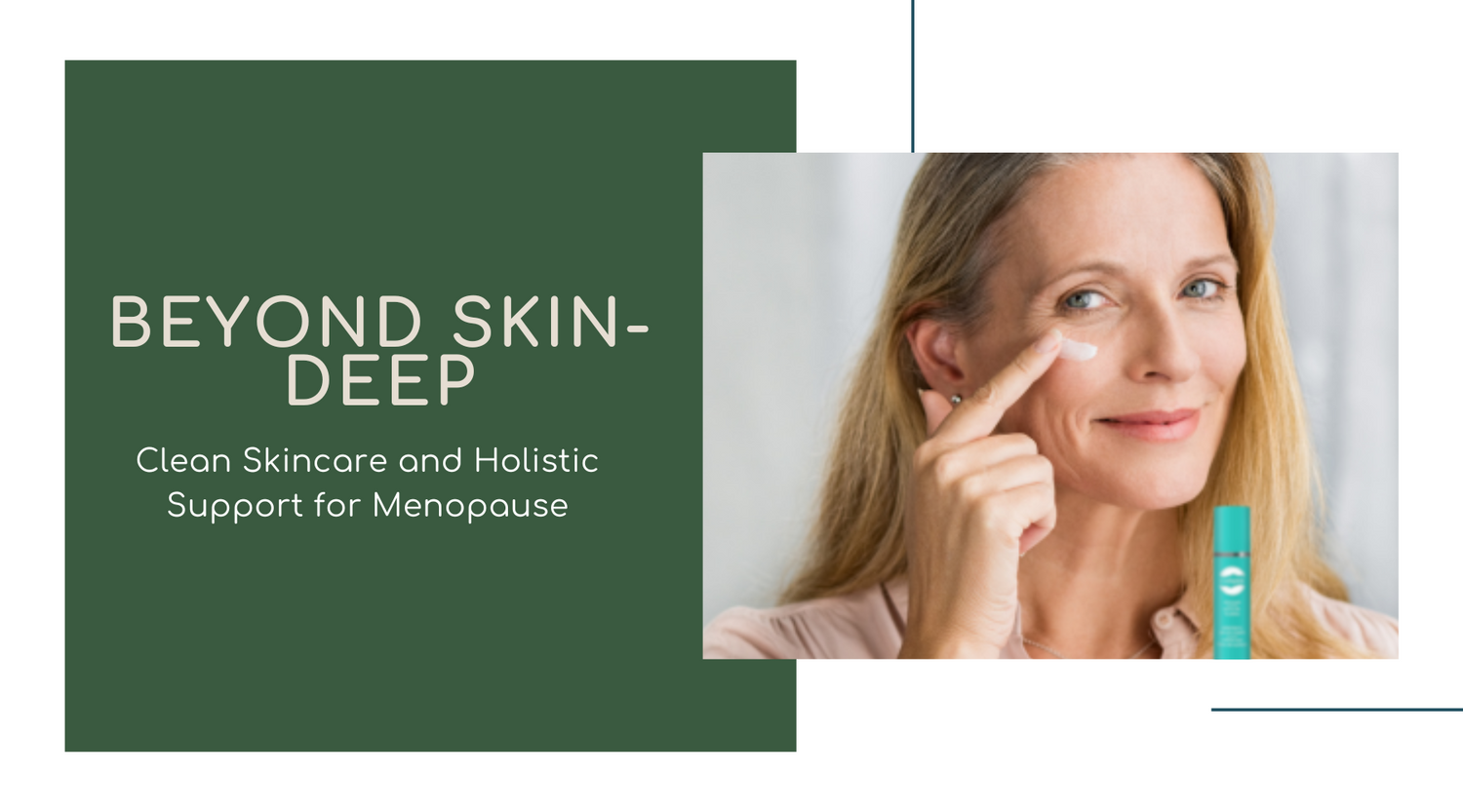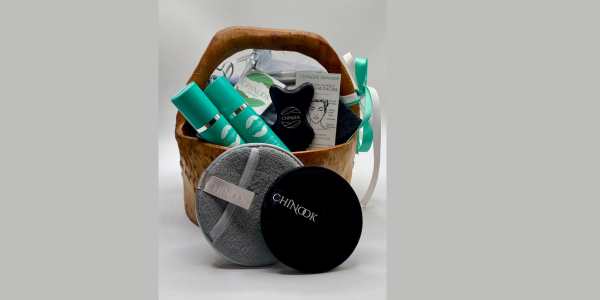
When aiming for a natural glazed look for acne-prone skin, it is crucial to prioritize natural skincare for a glowing complexion and radiant skin. Taking care of your skin ensures it remains healthy and well-nourished, providing the perfect canvas for makeup application.
A consistent skincare routine that involves gentle cleansing, exfoliation, and moisturization can do wonders for your complexion.
As for makeup, opt for non-comedogenic products specifically designed for acne-prone skin. Consider using a lightweight, oil-free foundation or tinted moisturizer to achieve a smooth base that allows your skin to breathe.
Amplify your skin's natural radiance by applying a luminous primer or highlighter to the high points of your face, resulting in a healthy glow. Select blush and bronzer for radiant skin that showcases your glowing complexion.
Click here to learn more about the Chinook skincare collection
Essential skincare tips for acne-prone skin
To achieve healthy skin and prevent breakouts, it is crucial to establish a skincare routine incorporating appropriate skincare products and following helpful skincare tips for individuals with acne-prone skin.
Incorporating the right skincare products and following a few simple tips can make a significant difference in the appearance and condition of your skin.
Here are some additional essential skincare tips to help you maintain a clear and glowing complexion:
Choose non-comedogenic makeup: When selecting makeup, opt for products that are labelled as non-comedogenic or acne-friendly. These products are formulated not to clog your pores and aggravate your skin.
Avoid overwashing your face: While cleaning your face as part of your skincare routine is crucial, remember to use gentle skincare products and follow expert skin care tips for achieving and maintaining healthy skin.
Choosing the right skincare products for your skin type
When selecting the proper skincare products for your skin type, it is important to understand your specific needs and concerns, such as incorporating the right skincare ingredients into your routine for acne-prone skin or choosing a suitable skincare regimen for oily skin.
Considering what your skin requires is crucial because different ingredients offer different benefits for various skin types.
For individuals with oily skin, searching for oil-free and mattifying products to control shine is recommended.
Conversely, for those with dry skin, it is advisable to choose hydrating products that contain an abundance of emollients to replenish moisture.
By choosing skincare products customized to your skin's unique needs, you can attain a clear and healthy complexion.
Skincare Products
- Skincare products should be selected based on your specific needs and concerns.
- Different skincare ingredients offer different benefits for various skin types.
- For oily skin, it is recommended to use oil-free and mattifying products to control shine.
- For dry skin, choosing hydrating products with an abundance of emollients is advisable to replenish moisture.
Creating an effective skincare routine for acne-prone skin
In the winter months, choosing the right skincare for dry skin is important to keep it nourished and hydrated. Daily sunscreen with at least SPF 30 can help prevent sun damage and protect acne-prone skin. Look for a sunscreen that is oil-free and non-comedogenic to avoid clogging your pores.
Another important step in taking care of acne-prone skin is to moisturize regularly. Contrary to popular belief, moisturizing is still necessary even with oily skin. Choose a lightweight, oil-free moisturizer that is specifically formulated for acne-prone skin. This will help maintain the skin's moisture balance without adding excess oil.
When it comes to makeup, opt for products labelled as non-comedogenic, meaning they won't clog your pores. Avoid heavy, oil-based foundations and instead choose lightweight, water-based formulas.
To achieve a natural glazed look, use a light hand when applying makeup and focus on enhancing your skincare for combination skin.
Key ingredients to look for in skincare products
Regarding skincare products, their key ingredients can play a crucial role in achieving healthy and radiant skin, especially for mature skin. While numerous options are available, certain ingredients stand out for their effectiveness.
For skincare targeting mature skin, ingredients like retinol and peptides help reduce wrinkles and improve skin elasticity. On the other hand, skincare products for men may benefit from ingredients like tea tree oil or salicylic acid, which combat acne and soothe razor burns.
Women can find ingredients like collagen or hyaluronic acid that benefit hydration and anti-aging effects. For teenagers dealing with acne, ingredients like benzoyl peroxide or sulfur can effectively clear blemishes.
By understanding the key ingredients in skincare products, you can make informed choices to address your specific skincare needs.
Key Ingredients in Skincare Products
- Retinol and peptides effectively reduce wrinkles and improve skin elasticity in mature skin.
- Tea tree oil and salicylic acid are beneficial ingredients for combating acne and soothing razor burn in skincare products for men.
- Collagen and hyaluronic acid provide hydration and anti-aging effects in skincare products for women.
- Benzoyl peroxide and sulphur are effective ingredients for clearing blemishes in skin care products for teenagers dealing with acne.
Tailoring your skincare regimen for oily and acne-prone skin
To update the article section and ensure complete sentences, please refrain from using the keyword achieve while discussing skincare for all ages and all skin types. For individuals with oily and acne-prone skin, designing a skincare routine that caters to their specific needs is essential.
It is important to control excess oil production while maintaining the skin's natural moisture balance.
Incorporating gentle yet effective cleansers can help remove impurities without stripping away moisture. When selecting a cleanser, look for one that is enriched with salicylic acid or tea tree oil. These ingredients are known to unclog pores and minimize breakouts.
Regularly exfoliating is important to prevent the buildup of oil and dead skin cells. Opt for chemical exfoliants like AHAs or BHAs, which are gentle and suitable for all skin types.
Gentle skincare for sensitive and acne-prone skin
When caring for sensitive and acne-prone skin, it is crucial to have a proper skincare routine that addresses blemishes, scars, hyperpigmentation, and dark spots. It is important to select products specifically formulated for your skin type that will not cause additional irritation.
One of the key steps in your routine should be using a gentle cleanser that does not strip your skin of its natural oils. Opt for fragrance-free options with soothing ingredients such as aloe vera or chamomile.
Incorporating a toner into your routine can help balance your skin's pH levels and remove impurities. Look for alcohol-free toners that contain ingredients like witch hazel or rose water.
Moisturizing is essential for keeping your skin hydrated. Choose lightweight, non-comedogenic moisturizers with hydrating ingredients like hyaluronic acid or ceramides. When dealing with acne, targeted treatments can help improve skincare for blemishes, scars, hyperpigmentation, and dark spots.
Balancing skincare for combination skin with acne concerns
Breakouts can be effectively treated with the right skincare for acne scars, skincare for uneven skin tone, skincare for redness, and skincare for inflammation. It is important to use these ingredients in moderation and consult a dermatologist to ensure they are appropriate for your skin type.
Regular exfoliation is another key aspect of a skincare routine for combination and acne-prone skin. Exfoliating can help remove dead skin cells and unclog pores, preventing breakouts. Look for gentle exfoliants that won't irritate the skin, such as those containing glycolic or lactic acid ingredients.
When cleansing, opt for a gentle cleanser that won't strip the skin of its natural oils. Harsh cleansers can cause the skin to produce more oil, leading to further breakouts. Look for cleansers that are labelled as non-comedogenic and specifically formulated for acne-prone skin.
In addition to your daily skincare routine, consider incorporating treatments such as skincare for acne scars, uneven skin tone, redness, and inflammation.
Nourishing skincare for dry and acne-prone skin
You can nourish your skin for a beautiful complexion with the right skincare routine. Hydration is crucial for dry skin as it lacks moisture, which can lead to flakiness and irritation. To combat this, look for skincare products specifically formulated for dry skin.
These products often contain ingredients like hyaluronic acid, glycerin, and ceramides. These ingredients attract and retain moisture, keeping your skin hydrated throughout the day.
When dealing with acne-prone skin, choosing non-comedogenic and oil-free products is important. These will help improve the appearance of your skin, whether you're dealing with breakouts, clogged pores, enlarged pores, or fine lines.
Skincare for Breakouts
- A skincare routine can significantly improve the appearance of breakouts.
- Non-comedogenic and oil-free products help prevent clogged pores and reduce breakouts.
- Proper hydration is essential for acne-prone skin to maintain a healthy complexion.
- Using skincare products formulated for acne-prone skin can help minimize the appearance of enlarged pores and fine lines.
Achieving a natural glazed look for all skin types
In addition to following a consistent skincare routine, you can enhance your journey towards achieving a natural glazed look for all skin types by incorporating skincare for wrinkles and skincare for sagging skin.
If you are worried about wrinkles, incorporate skincare products enriched with anti-aging ingredients like retinol and hyaluronic acid. These can help reduce the appearance of fine lines and promote a youthful complexion.
If sagging skin is a concern, look for products containing peptides and collagen-boosting ingredients to help firm and tighten the skin.
For dull and tired skin, incorporate brightening ingredients such as vitamin C and exfoliating agents like AHAs. These can help rejuvenate and restore radiance to your complexion.
Using the right skincare tailored to your skin's needs, you can confidently achieve a natural glazed look regardless of your skin type.
How to Get a Glowing Complexion with Acne-Prone Skin
If you struggle with acne-prone skin, achieving a natural glazed look may seem daunting, but it becomes more attainable with the right skincare for aging skin. Incorporating the right skincare routine and making a few lifestyle changes can help you attain a radiant complexion without compromising the health of your skin.
It is important to focus on gentle cleansing, exfoliation, and moisturizing to keep your skin clean, clear, and hydrated.
You can use natural remedies such as tea tree oil or aloe vera to soothe and heal acne-prone skin.
Choosing non-comedogenic makeup and avoiding heavy foundations can prevent clogged pores and breakouts.
Maintaining a healthy diet, regular exercise, and adopting skincare for environmental damage can contribute to a glowing complexion.
Top Tips for a Radiant Complexion
Unlock a Natural Skin Glaze: Master the Art of Radiant Complexion





